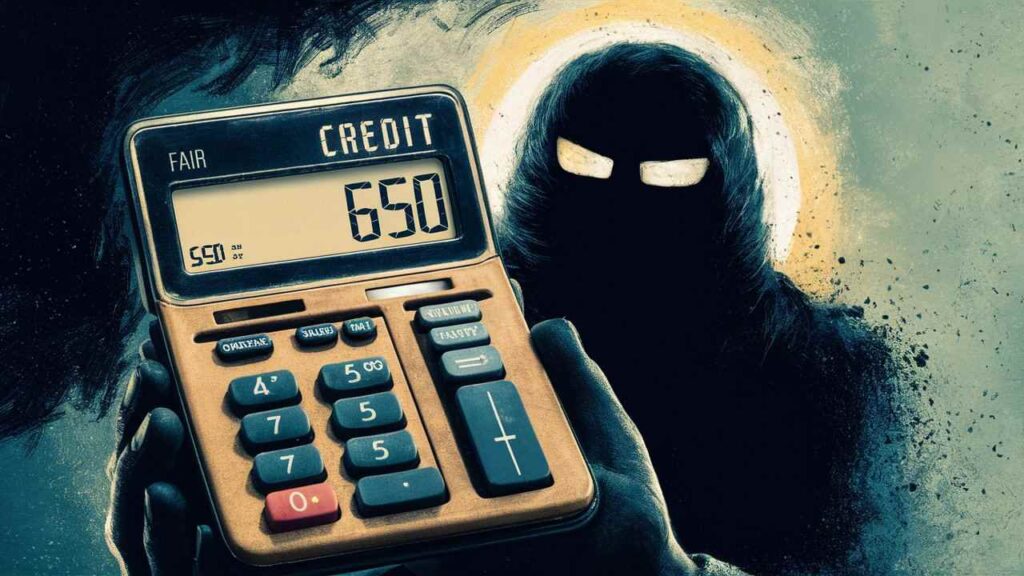Why Your Fair Credit Score Deserves Attention
In a world where credit scores reign supreme, your Fair Credit Score is like the middle child of the financial family-often overlooked but still holding significant sway. It’s not the gleaming, gold-standard score that opens every door, nor is it the lowly number that slams them shut. Yet, this seemingly modest score can dictate the interest rates you pay, the credit options available, and even your stress levels. Understanding your Fair Credit Score isn’t just about knowing where you stand—it’s about knowing how to stand taller in the eyes of lenders.

What is a Fair Credit Score? Understanding the Basics
A Fair Credit Score typically falls between 580 and 669 on the FICO scale. It’s that murky middle ground where you’re neither a credit superstar nor a financial outcast. This range signals to lenders that you’re somewhat reliable, though not without your quirks. Think of it as being on the C-list—you’re still invited to the party, but don’t expect to be handed the keys to the VIP lounge. Understanding what makes a credit score “fair” involves delving into the factors that shape it, from payment history to credit utilization, and how they interact to create that magic number.
Breaking Down the Numbers: What Makes a Credit Score Fair?
What does it take to earn a Fair Credit Score? The formula isn’t as mysterious as you might think. Your payment history, which makes up 35% of your score, is like the foundation of a house—crucial, and if shaky, everything else wobbles. Then there’s credit utilization, the percentage of your credit limits you’re using, which contributes 30%. Maxing out those cards? That’s a red flag. Length of credit history, new credit inquiries, and types of credit in use round out the equation, each playing a smaller yet significant role in determining whether your score lands in the fair zone.
Credit Score Ranges: Where Does Fair Fit In?
Credit scores are typically divided into five categories: poor, fair, good, very good, and exceptional. The fair range sits just above poor, providing a slight cushion against financial freefall. It’s the difference between a credit card application being met with a polite nod or a stern shake of the head. If you’re in the fair range, you’re on the precipice-one financial misstep could send you tumbling into the dreaded poor category, while a few smart moves could catapult you into the more favorable good range.
Why “Fair” Isn’t Great but Isn’t Terrible Either
Having a Fair Credit Score is a bit like being in purgatory-not quite bad, but not exactly heavenly either. It’s a place where you have access to credit, but often at a cost. High-interest rates, limited credit options, and the occasional rejection letter can make it feel like you’re walking a tightrope. However, it’s not all doom and gloom. A fair score means you still have room to improve, and with a bit of diligence, you can climb your way out of the middle ground and into more rewarding financial territory.

The Good: Perks of Having a Fair Credit Score
Access to Credit: It’s Not All Doom and Gloom
Having a Fair Credit Score doesn’t mean you’re cut off from the world of credit. Far from it. Lenders are still willing to work with you-they just might require a little more reassurance. You might not qualify for the lowest interest rates or the highest credit limits, but you’re not entirely out of the game. Think of it as getting into the concert, even if your seats are in the nosebleed section. Access to credit, even with a fair score, can still help you build a better financial future.
Better Than Bad: Why Fair is Still Better Than Poor
When comparing fair to poor, fair starts to look pretty good. Poor credit scores (under 580) often result in outright rejections, sky-high interest rates, and a general feeling of financial dread. Fair, on the other hand, is like being in a long line at the DMV-you’re not thrilled about it, but at least you’re moving forward. With a fair score, you have options that those with poor credit don’t, including the ability to qualify for loans, credit cards, and possibly even a mortgage, albeit with some caveats.
Potential for Improvement: The Silver Lining in a Fair Score
One of the most encouraging aspects of having a Fair Credit Score is the potential for improvement. You’re not starting from scratch; you have a foundation to build upon. With some strategic financial decisions-like paying bills on time, reducing debt, and avoiding unnecessary credit inquiries-you can watch your score climb. It’s like being in a half-full glass situation: with a little effort, you can top it off, turning fair into good, and good into great.
Lower Risk to Lenders: Why They Still Want Your Business
Despite not being an ideal borrower, you’re not a pariah in the lending world. A Fair Credit Score suggests that while you might have had some bumps along the road, you’re not a complete risk. Lenders see potential in you, which is why they’re still willing to offer credit, albeit with conditions. You’re like a draft pick with promise-there’s room for growth, and with the right moves, you could become a star player in your financial league.

The Bad: The Drawbacks of a Fair Credit Score
Higher Interest Rates: The Price You Pay for Fair
One of the most immediate drawbacks of a Fair Credit Score is the cost literally. With fair credit, you’ll often face higher interest rates on loans and credit cards. This is how lenders hedge their bets, compensating for the perceived risk of lending to someone who’s not quite prime. Over time, these higher rates can add up, making it more expensive to carry a balance or finance a large purchase. It’s like paying a tax for not having perfect credit-a financial penalty that can strain your budget.
Limited Credit Options: Why Lenders Hesitate
Another challenge of a Fair Credit Score is the limited range of credit products available to you. While you might still get approved for a credit card or loan, the choices are often narrower, with less favorable terms. Premium credit cards with rich rewards? Those might be out of reach. Similarly, loans with low fees or special perks are often reserved for those with better credit. It’s a bit like shopping at a discount store what you get is serviceable, but don’t expect anything too luxurious.
Less Bargaining Power: Negotiating with a Fair Score
When your credit score is fair, your ability to negotiate favorable terms is diminished. Lenders know you don’t have the leverage that comes with a higher score, so they’re less likely to offer concessions. Whether it’s negotiating a lower interest rate, a higher credit limit, or better loan terms, you’re often at the mercy of the lender’s policies. It’s like haggling at a flea market when the vendor knows you really want that antique lamp you’re unlikely to walk away with a steal.
Possible Rejections: The Cold Reality of Loan Applications
While a Fair Credit Score doesn’t guarantee rejection, it does make it more likely, particularly for loans or credit lines that require a higher threshold. When lenders see a fair score, they may be more cautious, scrutinizing your application more closely. This can result in frustrating denials, even when you think you’ve met the basic criteria. It’s like applying for your dream job with a resume that’s good, but not great sometimes, good isn’t quite good enough.
The Ugly: The Hidden Pitfalls of a Fair Credit Score
The Credit Trap: How Fair Can Turn Into Poor
One of the uglier aspects of a Fair Credit Score is how easily it can slip into poor territory. A missed payment here, a maxed-out credit card there, and suddenly, your score takes a nosedive. This downward spiral can happen faster than you might think, especially if you’re not actively managing your credit. It’s a slippery slope, where the consequences of small mistakes are magnified, leading to a situation where fair turns to poor, and recovery becomes an uphill battle.
Credit Score Anxiety: The Stress of Living on the Edge
Living with a Fair Credit Score can also take a psychological toll. There’s a constant awareness that you’re on the cusp neither safe nor in dire straits, but always teetering. This can lead to credit score anxiety, where every financial decision is fraught with worry about its potential impact on your score. It’s like walking a financial tightrope, where one wrong step could send you tumbling into the abyss of poor credit.
Long-Term Financial Impact: The Cost of Staying Fair
Staying in the fair credit range over the long term can have significant financial consequences. The cumulative effect of higher interest rates, limited credit options, and missed opportunities can add up, costing you thousands over the years. It’s like running a marathon with a pebble in your shoe each step is a little more painful, and by the end, you’re left wondering how much easier the journey could have been without that persistent irritant.
Debt Spirals: How Fair Can Lead to Financial Trouble
Another ugly reality of a Fair Credit Score is the potential for debt spirals. When your score limits your access to affordable credit, you might find yourself relying on higher-cost options, like payday loans or subprime credit cards. These can quickly lead to a cycle of debt, where the interest and fees outpace your ability to pay them off. It’s a financial quagmire, where each attempt to dig yourself out only pulls you deeper into trouble.
How Did You Get Here? Common Causes of a Fair Credit Score
Late Payments: The Silent Score Killer
Late payments are one of the most common reasons people find themselves with a Fair Credit Score. Even a single late payment can have a noticeable impact, as payment history is the largest factor in calculating your score. It’s a bit like having a spotless driving record, only to have it marred by a single fender bender suddenly, your premiums go up, and you’re left dealing with the fallout of that one mistake.
High Credit Utilization: When Balances Tip the Scale
Another common culprit behind a Fair Credit Score is high credit utilization. This occurs when you’re using a significant portion of your available credit, making you appear riskier to lenders. It’s akin to living paycheck to paycheck there’s little room for error, and one unexpected expense can push you over the edge. Keeping your balances low relative to your credit limits is key to maintaining or improving your score.
Limited Credit History: The Double-Edged Sword
Having a limited credit history can also contribute to a Fair Credit Score. If you haven’t been using credit for very long, lenders have less information to base their decisions on, which can result in a lower score. It’s like being a newcomer in town people don’t know you well enough to trust you yet. While you might not have any negative marks on your credit, the lack of a substantial track record can still hold you back.
Credit Report Errors: The Unseen Saboteur
Sometimes, a Fair Credit Score isn’t your fault at all it’s the result of errors on your credit report. These could be mistakes in reporting, such as a payment marked late when it wasn’t, or even signs of identity theft. It’s like having a black mark on your record for a crime you didn’t commit. Regularly checking your credit report for errors and disputing any inaccuracies is essential to ensuring your score reflects your true financial behavior.
Turning Fair Into Good: Steps to Improve Your Credit Score
On-Time Payments: The Simple Trick That Works Wonders
One of the most effective ways to improve a Fair Credit Score is by making on-time payments consistently. It’s a straightforward strategy, but it’s incredibly powerful. Each on-time payment you make is like a deposit into your credit score’s piggy bank, steadily increasing your balance. Over time, this can help move you from fair to good, and eventually, to even higher credit echelons.
Lowering Your Balances: Winning the Credit Utilization Battle
Another key step in boosting your credit score is lowering your balances. High credit utilization can drag your score down, so paying off debt and keeping balances low is crucial. It’s like lightening your load on a long hike the less you’re carrying, the faster you can move. By reducing your balances, you can improve your credit utilization ratio and give your score a healthy boost.
Diversifying Credit: Mix It Up for a Better Score
Lenders like to see that you can handle different types of credit responsibly, so diversifying your credit mix can also help improve your score. This might involve adding an installment loan if you only have credit cards, or vice versa. It’s like proving you’re a well-rounded individual not just good at one thing, but capable of handling a variety of challenges. A diverse credit portfolio can signal to lenders that you’re a lower risk, which can help raise your score.
Disputing Errors: Cleaning Up Your Credit Report
If your credit score is being held back by errors on your credit report, disputing those inaccuracies is essential. This process involves identifying mistakes, providing evidence to the credit bureaus, and following up to ensure corrections are made. It’s like clearing your name after being falsely accused setting the record straight can have a significant positive impact on your score.
Credit Monitoring: Keeping Tabs on Your Score
Finally, staying on top of your credit score through regular monitoring can help you catch potential issues before they become major problems. Credit monitoring services alert you to changes in your score, new accounts opened in your name, and other important updates. It’s like having a security system for your financial life—providing peace of mind and helping you maintain control over your credit destiny.
When Fair is Just Fine: Situations Where Fair is Enough
Living Within Your Means: When a Fair Score Matches Your Goals
In some situations, a Fair Credit Score is perfectly adequate, especially if you’re living within your means and aren’t planning any major financial moves. If you’re not looking to take out large loans or open new credit lines, your fair score might be sufficient for your needs. It’s like driving a reliable sedan instead of a luxury sports car practical, functional, and well-suited to your current lifestyle.
Avoiding Credit Traps: When Playing it Safe Pays Off
Sometimes, playing it safe with a Fair Credit Score is the best strategy, particularly if you’re wary of taking on more debt. By avoiding high-interest loans, unnecessary credit inquiries, and other credit traps, you can maintain your score while minimizing risk. It’s like sticking to well-marked trails on a hike safer, with fewer surprises along the way.
When to Seek Professional Help: Credit Counseling Options
If you’re struggling to improve your Fair Credit Score or are unsure how to manage your finances effectively, seeking professional help through credit counseling can be a wise decision. Credit counselors can help you develop a plan to pay off debt, manage your budget, and improve your score. It’s like hiring a personal trainer for your finances guiding you toward your goals with expert advice and support.
BOTTOM LINE
Embracing the Fair: Making the Most of Your Current Score
Rather than lamenting a Fair Credit Score, embrace it as a starting point for improvement. By understanding its strengths and limitations, you can make informed decisions that benefit your financial future. It’s like making the most of a middling hand in poker play your cards right, and you can still come out ahead.
Planning for the Future: Setting Goals for Credit Improvement
Looking ahead, setting specific, achievable goals for credit improvement can help you move from fair to good or even excellent. Whether it’s paying down debt, making on-time payments, or diversifying your credit mix, each step you take brings you closer to a stronger financial position. It’s like setting out on a journey with a clear destination in mind the path may be long, but with perseverance, you’ll get there.
Final Thoughts: Is Fair Credit Really That Ugly?
At the end of the day, a Fair Credit Score isn’t the end of the world it’s just a step on your financial journey. While it has its drawbacks, it also offers opportunities for growth and improvement. With the right strategies and a bit of patience, you can turn a fair score into something far more impressive. It’s like finding a diamond in the rough polish it enough, and it can shine just as brightly as any other.
Frequently Asked Questions (FAQs)
Is Fair Credit Average?
Fair credit is not considered average, but it’s close. The term “fair” typically refers to credit scores in the range of 580-669. While it’s below the “good” category, it’s better than poor credit. Fair credit indicates that there’s room for improvement, but you’re not at the bottom of the credit spectrum.
What’s the Highest Credit Score?
The highest credit score possible on the FICO scale is 850. Achieving this score is rare and requires a flawless payment history, low credit utilization, a lengthy credit history, and a diverse mix of credit accounts. However, any score above 800 is generally considered excellent and will qualify you for the best interest rates and credit terms.
Is a 750 Credit Score Rare?
A 750 credit score is not rare but is considered excellent. It places you well above the average U.S. credit score and within the “very good” range. With a 750 score, you’re likely to receive favorable terms on loans and credit cards, including lower interest rates and higher credit limits.
How Much Money Can I Borrow with a 700 Credit Score?
With a 700 credit score, you are in the “good” credit range, meaning you have access to various loan options. The exact amount you can borrow depends on several factors, including your income, debt-to-income ratio, and the lender’s policies. Typically, a 700 score can help you secure a personal loan in the range of $3,000 to $50,000, depending on your financial situation.
How Much Credit Score is Good?
A good credit score typically falls between 670 and 739 on the FICO scale. Scores in this range indicate a history of responsible credit management and are likely to get you approved for loans with reasonable interest rates and terms.
Is 700 a Credit Score?
Yes, a 700 credit score is a good score. It places you in the lower end of the “good” category on the FICO scale, making you a strong candidate for most loans and credit products with favorable terms.
Is a 650 Credit Score Bad?
A 650 credit score is considered fair. While it’s not bad, it does indicate some credit risk to lenders. You might still qualify for loans or credit cards, but you may face higher interest rates and less favorable terms compared to someone with a higher score.
Is Fair Credit Better Than Poor Credit?
Yes, fair credit is better than poor credit. While fair credit is not ideal, it still allows for more financial opportunities compared to poor credit, which typically falls below 580. With fair credit, you have a better chance of being approved for loans and credit cards, although likely at higher interest rates.
What Credit Score Do I Need for a $3,000 Loan?
To qualify for a $3,000 loan, a credit score of at least 600 is generally needed. However, the exact requirement can vary depending on the lender. Some may offer loans to those with fair credit (580-669), while others may require a higher score for approval.
Can I Get a Loan if I Have a Fair Credit Score?
Yes, you can get a loan with a Fair Credit Score, but the terms may not be as favorable as those offered to individuals with higher scores. Lenders may charge higher interest rates or offer lower loan amounts to mitigate the risk.
Is a 500 Credit Score Fair?
No, a 500 credit score is not considered fair. It falls in the “poor” range, indicating a higher risk to lenders. With a score this low, you may struggle to get approved for credit, and if you do, it will likely come with very unfavorable terms.
How to Get a $5,000 Credit Card?
To get a $5,000 credit card limit, you typically need a credit score of at least 700, although it can vary depending on the issuer. Additionally, having a stable income, low debt-to-income ratio, and a history of responsible credit use will improve your chances.
Is a 600 Credit Score Good or Fair?
A 600 credit score is considered fair. It’s on the lower end of the fair range and suggests some credit challenges. Improving your payment habits and reducing debt can help raise this score into the good range.
What is Fair Credit?
Fair credit refers to a credit score range of 580 to 669. It suggests that while you may have some credit issues, you’re not in the poor category. Fair credit provides access to credit products, but often at higher interest rates.
Can I Get Finance with a Fair Credit Score?
Yes, you can get financing with a Fair Credit Score, but expect to pay higher interest rates and face stricter lending terms. It’s advisable to shop around and compare offers to find the best possible terms.
Is Fair an OK Credit Score?
A Fair Credit Score is just that OK. It’s not great, but it’s also not terrible. It allows for access to credit, though often with less favorable terms than those available to people with good or excellent scores.
How to Get Credit Score to 600?
To raise your credit score to 600, focus on making all payments on time, reducing your credit card balances, and avoiding new credit inquiries. Over time, these actions can help improve your score.










